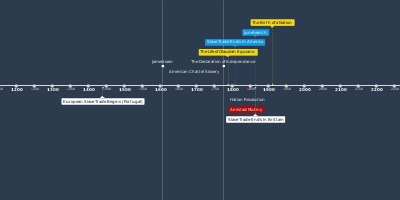4 Jul 1910 Jahr - "Fight of the Century"
Beschreibung:
John Arthur "Jack" Johnson (March 31, 1878 – June 10, 1946), nicknamed the Galveston Giant, was an American boxer who, at the height of the Jim Crow era, became the first African American world heavyweight boxing champion (1908–1915). Among the period's most dominant champions, Johnson remains a boxing legend, with his 1910 fight against James J. Jeffries dubbed the "fight of the century".In 1910, former undefeated heavyweight champion James J. Jeffries came out of retirement to challenge Johnson, saying "I am going into this fight for the sole purpose of proving that a white man is better than a Negro". He had not fought in six years and had to lose well over 100 pounds to get back to his championship fighting weight. Initially, Jeffries had no interest in the fight, but those who wanted to see Johnson defeated badgered Jeffries mercilessly for months, and offered him an unheard sum of money, reputed to be about $120,000 (equivalent to $3.3 million in 2019) which he finally accepted.
The fight took place at a ring built just for the occasion in downtown Reno, Nevada in front of 20,000 people. Jeffries proved unable to impose his will on the younger champion and Johnson dominated the fight. By the 15th round, after Jeffries had been knocked down twice for the first time in his career, Jeffries' corner threw in the towel to end the fight and prevent Jeffries from having a knockout on his record. Johnson later remarked he knew the fight was over in the 4th round when he landed an uppercut and saw the look on Jeffries' face, stating, "I knew what that look meant. The old ship was sinking." Afterward, Jeffries was humbled by the loss and what he'd seen of Johnson in their match. "I could never have whipped Johnson at my best", Jeffries said. "I couldn't have hit him. No, I couldn't have reached him in 1,000 years."
The outcome of the fight triggered race riots that evening—the Fourth of July—all across the United States, from Texas and Colorado to New York and Washington, D.C. Johnson's victory over Jeffries had dashed white dreams of finding a "great white hope" to defeat him. Many whites felt humiliated by the defeat of Jeffries. Race riots erupted in New York, Pittsburgh, Philadelphia, New Orleans, Atlanta, St. Louis, Little Rock, and Houston. In all, riots occurred in more than 25 states and 50 cities. At least twenty people were killed across the US from the riots, and hundreds more were injured.
Blacks, on the other hand, were jubilant and celebrated Johnson's great victory as a victory for racial advancement. Black poet William Waring Cuney later highlighted the black reaction to the fight in his poem "My Lord, What a Morning". Around the country, blacks held spontaneous parades and gathered in prayer meetings.
The Johnson-Jeffries Fight film (1910) received more public attention in the United States than any other film to date and for the next five years, until the release of The Birth of a Nation.
Zugefügt zum Band der Zeit:
Datum:
4 Jul 1910 Jahr
Jetzt
~ 115 years ago
